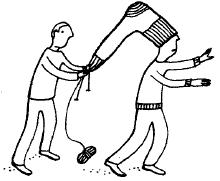
in a piranha – infested river, alligators do backstroke
Once upon a time life was straightforward: the chief ran the show and everyone fell in behind:
pfhatla-pfhatla (Tsonga, South Africa) to make a present to the chief to abate his anger
tarriqu-zan (Persian) an officer who clears the road for a prince
chātra (Pali, India) one who carries his master’s sunshade
vwatika (Mambwe, Zambia) to place the pipe in the mouth of the chief
kapita mwene (Mambwe, Zambia) the time of the stroll taken by the chief (between 9 and 10 p.m., when everyone had retired, the chief would go about quietly, eavesdropping to find out those talking about him)
magani (Mindanao, Philippines) the custom of obtaining leadership and the right to wear red clothes through killing a certain number of people
tirai (Tamil) a tribute paid by one king to another more powerful
ramanga (Betsileo, Madagascar) a group of men whose business is to eat all the nail-parings and to lick up all the spilt blood of the nobles (literally, blue blood)
mangkat (Indonesian) to die for one’s king or queen
Things weren’t so great for those at the bottom of the pile, however interesting their duties:
ravey (Manobo, Philippines) to enslave someone because he didn’t obey a command
dapa (Malay) a slave-messenger sent as a gift with a proposal of marriage
dayo (Bikol, Philippines) a slave who stands guard over the grave of a leading member of the community so that the body will not be disinterred by sorcerers
pachal (Malay) a slave of a slave
golamkhana (Bengali) a factory for imbuing people with a slave mentality
tank (Tocharic, Turkey) to interfere
tilts (Latvian) bridge
Transparent (German) banner, placard
bingo (Kapampangan, Philippines) chip in a blade
doshman (Romani) enemy
exito (Spanish) success
Parole (German) motto, slogan
Democracy freed us from the old hierarchies and gave us the power to choose our own destinies…
valboskap (Swedish) ignorant voters (who vote as they are told)
qualunquismo (Italian) an attitude of indifference to political and social issues
apocheirotonesis (Ancient Greek) a rejection by a show of hands
chaquetero (Central American Spanish) someone who changes political ideas as easily as changing shirts
porros (Mexican Spanish) thugs who stand around polling stations and intimidate voters
… with leaders directly answerable to us and our interests:
phak kanmuang (Thai) political parties that become active only during or prior to elections
Politpopper (German) politically correct and correctly dressed (literally, a square politician)
göra en hel Pudel (Swedish) a politician, or some other well-known person who has done something bad, publicly admitting being bad but promising not to do it again and humbly asking for forgiveness (literally, do a full poodle)
Perhaps we just have to accept that the political mindset is never going to change that radically:
aincātānī (Hindi) the manipulation and manoeuvring, tugging and pulling, a struggle inspired by selfish motives
ficcarsi (Italian) to get access to a group to gain advantages from them
başina çorap örmek (Turkish) to plot against someone (literally, to knit a sock for the head)

akal bulus (Indonesian) a cunning ploy (literally, a turtle’s trick)
akarnok (Hungarian) someone with unscrupulous ambition
It’s commonly accepted that there are all kinds of unofficial extra benefits to being in power. The phrase in the Sinhala language of Sri Lanka for a local member of parliament, dheshapaalana adhikaari, also means crook and someone born out of wedlock:
sglaim (Gaelic) a great deal of the good things of life acquired in a questionable way
dedocratico (Spanish) an undemocratic appointment to a governmental position
zalatwic (Polish) using acquaintances to accomplish things unofficially
bal tutan parmağim yalar (Turkish proverb) a person who holds the honey licks his finger (a person given a job involving valuables will gain some benefit for himself)
kazyonnovo kozla za khvost poderzhat – mozhno shubu sshit’ (Russian proverb) just even from having once held a state goat’s tail one can make a fur coat (i.e. an official can make money by bribes)
Many everyday English words are derived from other languages. Finding out more about their roots often casts a fascinating new light on the word itself:
accolade derives from the French accoler (to embrace) because knighthoods were initially conferred with an embrace
agony comes from the Ancient Greek agonia (contest): the athletes in training for the Olympic Games put their bodies through intense discipline to reach the peak of fitness, denying themselves normal pleasures and enduring punishing physical tests
coward comes from the Old French couard (tail) and thus we have the image of a dog retreating with its tail between its legs
jargon conies from the Old French word jargoun (twittering), the sound made by birds, incomprehensible to others
muscle is descended from the Latin word musculus (little mouse), a rather apt description of the moving and changing form under the skin, especially of the arms and legs
The language of politics is famous for both rollo (Spanish), the long boring speech (literally, a paper roll), and for double speak. All round the world it’s very important to listen extremely closely to what politicans say – and to what they don’t:
borutela (Tsonga, South Africa) to praise another in his presence but malign him behind his back
feleka (Setswana, Botswana) to speak so as to conceal one’s meaning; to be intentionally ambiguous
chíndugirathu (Tamil) to give a sign by pressing with the finger, unobserved by any third party
tok bokkis (Tok Pisin, Papua New Guinea) a way of giving words hidden meanings (literally, talk box)
achakiy (Quechuan, Andes) to say one thing and do something else
The Bambuti people of Congo have no chiefs or formal system of government; problems and disputes are solved by general discussion often involving the use of humour. Elsewhere, people have other ways of achieving agreement:
taraadin (Arabic) a compromise; a way of solving a problem without anyone losing face
mochi (Chinese) the rapport or teamwork that enables people to cooperate smoothly (literally, silent contract)
remettre les pendules à l’heure (French) to re-align something, for example, in establishing who is the boss, or how we work, or anything else (literally, to set the clocks at the right time again)
biritululo (Kiriwani, Papua New Guinea) comparing yams to settle a dispute
What a shame that such delightful methods can’t be universally employed. But from the start of time dispute-resolution has often been alarmingly violent:
gazi (Mauritanian dialect) a plundering raid in which at least forty camels are employed
falurombolás (Hungarian) the destruction of villages
Schrecklichkeit (German) a deliberate policy of terrorizing non-combatants
edsabil (Maguindanaon, Philippines) to fight until death for the cause of Allah
nuulone (Anywa, Nilo-Saharan) a victory dance with rifles after a war
All that’s changed over the years is the deadliness of the weapons used:
dagadaga (Sranan Tongo, Surinam) a machine gun
plofstof (Afrikaans) explosive (literally, puff/bang stuff)
springstof (Dutch) an explosive (literally, jump matter)
rakovye voiska (Russian) strategic missile forces (literally, cancer forces – referring to the numerous cancerous diseases caused by radiation)
On the battlefield itself individuals make extraordinary sacrifices…
lwa manyanga (Mambwe, Zambia) to fight one another crawling along on all fours
mamakakaua (Hawaiian) the leading man in battle who bears the brunt of the fighting
ohiampunut (Finnish) one who has survived in battle (literally, shot/fired past)
abhí-vīra (Sanskrit) surrounded by heroes
… or not, as the case may be:
ngivhe (Venda, South Africa) to hit with the butt-end of a spear (a blow given as a warning to escape)
rafizat (Persian) a body of soldiers who deserted their commander and retreated
imboscarsi (Italian) to lie in ambush, to evade military service, to avoid working, or to retreat to a secluded place to make love (literally, to take to the woods)
palias (Maranao, Philippines) the power or magic which protects its possessor from a bullet in battle
Handschuhschneeballwerfer (German) somebody who wears gloves to throw snowballs – used in general for all cowards
There are no limits to cruelty, savagery and treachery:
liput (Manobo, Philippines) to throw someone off guard, through an appearance of goodwill, in order to kill him
usauara (Yamana, Chile) to shout, as a group of men, when ready to make an assault on someone they intend to kill
áhaneoha’ov (Cheyenne, USA) to kill someone by stepping on him
tsantsa (Jivaro, Ecuador) a human head shrunken and dried as a war trophy
tzompantli (Aztec) a rack of skulls
But when it’s all over, what are we left with?
aidos (Ancient Greek) the understanding of the need for humility at the point of victory
Gleichgültigkeit (German) the feeling of dreadful moral insensibility and detachment which is a peculiar legacy of wars
And, all too often, a large standing army. Who better than the Russians to tell us all about the realities of that sort of organization?
ogourets a soldier in his first six months of service (literally, a cucumber – referring to the colour green, which signifies inexperience)
pomazok a soldier who has served more than one year and is therefore released from certain menial tasks (literally, a shaving brush)
chelovek-amfibiya a soldier on dishwashing duty (literally, an amphibian man)

khoronit’ okourok a punishment for soldiers who drop their cigarette butts on the ground; when even one such butt is found all soldiers are woken up in the middle of the night and forced to spend hours digging deep holes to bury individual butts
lekarstvo ot lyubvi two years of army service (literally, a cure for love, meaning that girlfriends rarely wait for soldiers to come home)
hay un gato encerrado (Spanish) there’s a cat shut up
les dés sont pipés (French) the dice are cheated
il y a anguille sous roche (French) there is an eel under the rock
iskat’ igolku v stoge sena (Russian) there is a needle in the bag
hayya min taht tibn (Arabic) a snake under the hay